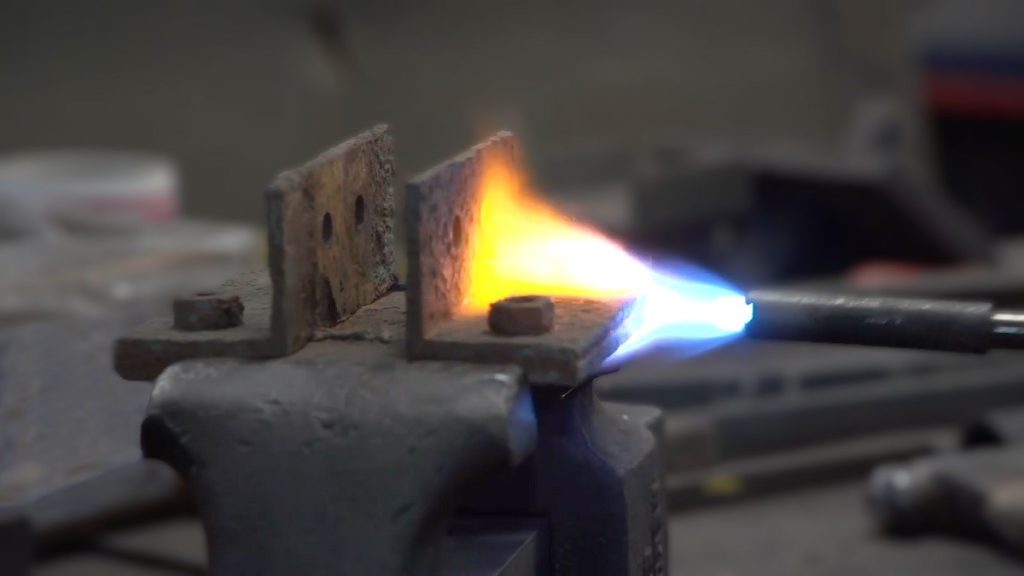We’ve all been there – a nut or bolt needs to be loosened, yet just won’t budge. Many things can cause metal parts to seize up, including rust, corrosion, paint, environmental factors and over-tightening.
There are many different methods for freeing stuck parts. A common technique is to apply heat, which may come in the form of a propane torch, acetylene torch, heat gun, induction heat or a heated element. So how does it work?
“Scientifically, heat expands metals, which can break the bonds of rust,” said Sevan Demirdogen, CEO – Kano Laboratories, producer of Kroil Original Penetrant and Kroil Penetrant with Silicone. “As metal cools, it contracts to break up rust. However, using heat in this way can be both tricky and risky. As such, heat should only be used in special circumstances.”
While using heat can be effective, there are many risks, and executing this process requires great skill. Without the proper technique, many problems can result, including:
The risk of burns and fire. Any time you work with heat or an open flame you run the risk of burning yourself, someone else or adjacent materials, or inadvertently setting something on fire.
Damaged or destroyed metal. If you heat a nut to a molten glow, the heat can damage or destroy the nut, bolt and any other adjacent parts. In cases involving hardened steel, applying heat can actually break down the hardened properties.
Dangerous gasses. Using an open flame in an unventilated, confined space can cause a dangerous atmosphere due to toxic gasses, carbon monoxide and/or oxygen depletion.
So, what’s a frustrated service pro to do? Penetrating oils have been used for decades to effectively free stuck metal parts, without the inherent risks of using heat. And, when it comes to freeing corroded items, nothing rivals powerful penetrants.
Inherently, penetrating oils are safer and more effective than the heat option, as they allow for direct application to affected areas. Using a penetrant instead of heat also keeps more delicate materials like gaskets, valve seats, o-rings, and insulation from being damaged.
“Penetrating oils have been used and trusted by MRO pros, service technicians and experienced DIYers for decades,” said Demirdogen. “The best penetrating oils will quickly loosen rusted nuts and bolts, free frozen shafts, pulleys and more. With Kroil, no space is too tight to reach, thanks to its ability to penetrate the smallest opening or crevice.”
With all that said, sometimes a part is so locked down that heat must be considered. So, can heat be used first and a penetrant later? Yes, said Demirdogen, but with some important warnings:
- Penetrants like Kroil are flammable and should never be used around an open flame. Similarly, do not apply heat immediately after an item has been sprayed with Kroil or any other chemical.
- Never apply Kroil to a freshly heated part for several reasons: it’s a fire and burn risk, and extreme heat can cause the chemicals in Kroil to evaporate sooner and become less effective.
- Don’t use penetrating oils and heat at the same time. On tough jobs, you can carefully pre-heat the part, let it cool, and then apply the penetrant.
Bottom line — whenever rust or corrosion slows you down, reach for a premium penetrating oil instead of a torch. You’ll be able to complete tough jobs faster and safer than the heat alternative. And, as Demirdogen says, if a worst-case scenario demands the use of heat, “then carefully heat it, cool it, Kroil it…and wrench it free.”
About Kano Laboratories
Founded in 1939 and based in Nashville, Tennessee, Kano is a leading producer of iconic, Kroil-branded penetrating oils and lubricants for the industrial maintenance, repair, and operations (“MRO”) and professional specialty trade markets. Kano has built a passionately loyal customer base around Kroil products, which are used by professionals to loosen rusted, corroded, and frozen mechanical parts. For more information, visit www.kroil.com
Source: Liza Klein, VP Marketing – Kano Laboratories

